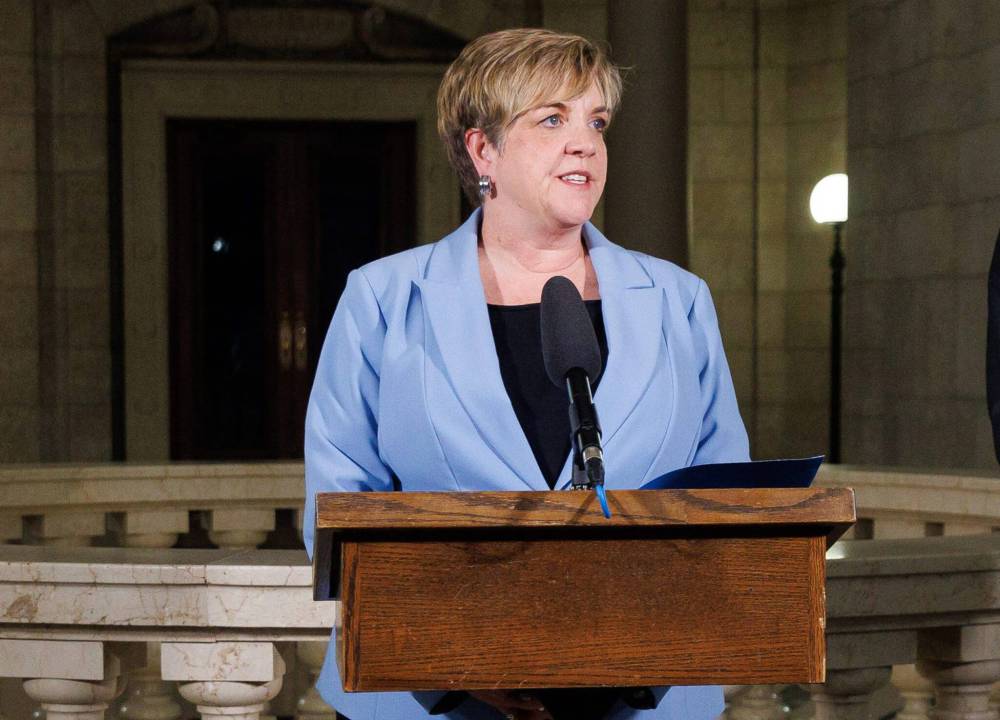Manitoba law to stop sex offenders from changing name
Proposal requires applicants submit to criminal record check, finger printing
Advertisement
Read this article for free:
or
Already have an account? Log in here »
To continue reading, please subscribe:
Monthly Digital Subscription
$1 per week for 24 weeks*
- Enjoy unlimited reading on winnipegfreepress.com
- Read the E-Edition, our digital replica newspaper
- Access News Break, our award-winning app
- Play interactive puzzles
*Billed as $4.00 plus GST every four weeks. After 24 weeks, price increases to the regular rate of $19.00 plus GST every four weeks. Offer available to new and qualified returning subscribers only. Cancel any time.
Monthly Digital Subscription
$4.75/week*
- Enjoy unlimited reading on winnipegfreepress.com
- Read the E-Edition, our digital replica newspaper
- Access News Break, our award-winning app
- Play interactive puzzles
*Billed as $19 plus GST every four weeks. Cancel any time.
To continue reading, please subscribe:
Add Free Press access to your Brandon Sun subscription for only an additional
$1 for the first 4 weeks*
*Your next subscription payment will increase by $1.00 and you will be charged $16.99 plus GST for four weeks. After four weeks, your payment will increase to $23.99 plus GST every four weeks.
Read unlimited articles for free today:
or
Already have an account? Log in here »
Hey there, time traveller!
This article was published 14/03/2024 (589 days ago), so information in it may no longer be current.
Convicted sex offenders could soon be banned from legally changing their names in Manitoba if an NDP bill passes into law.
Government Services Minister Lisa Naylor — whose portfolio includes the Vital Statistics Branch, which handles name changes — introduced The Change of Name Amendment Act at the legislature Thursday.
“When someone has survived sexual violence, they want to know that the perpetrator can’t simply hide behind a new identity,” Naylor told reporters. “This legislation makes Manitoba a more hostile environment for serious violent offenders.”

MIKE DEAL / FREE PRESS FILES
Lisa Naylor, government services minister
Naylor said the bill would ban people from legally changing their name if they have been convicted of a sex-related criminal offence, and possibly other “serious offences” such as the human trafficking of children, and murder. The province will consult with victim service organizations, police and others, prior to determining what offences are included, Naylor said.
The proposed legislation would require people who apply to change their name to submit to a criminal record check, in addition to finger printing, which already takes place, Naylor said.
If someone is flagged as having committed one of the yet-to-be-determined offences, their application won’t be processed, Naylor said. However, the written bill states people can apply for exemptions.
The Free Press reported in December that Manitoba allows people convicted of sex crimes to change their names, unlike other provinces. Victims — including a woman who was stalked by a sex offender who had changed his name — and advocates were outraged by the news. They feared it could allow people to hide their past and possibly perpetrate another crime.
At the time, RCMP said four Manitobans on the sex-offender registry had changed their legal names since April 2021.
Greg Gilhooly, who wrote a book (I Am Nobody) about the abuse he suffered at the hands of former Winnipeg hockey coach and convicted-sex offender Graham James decades ago, applauded the government.
“When someone has survived sexual violence, they want to know that the perpetrator can’t simply hide behind a new identity.”–Lisa Naylor
“Anything that attempts to hold abusers to account is a good thing,” Gilhooly said.
He said he understands why a sex offender would want a new start in life, but victims must live with the crimes perpetrated against them. Offenders should not be able to run from their past, Gilhooly said.
However, Mike Cook, a Winnipeg criminal defence attorney, thinks those who have served their time do deserve a chance to move on with their lives and reintegrate into society.
“I think every person is entitled to reformation,” Cook said. “This certainly goes against that.”
Naylor said Manitoba’s proposed law would have more teeth than other jurisdictions because it includes those who’ve committed non-sex offences.
Other provinces, including Alberta and Saskatchewan, have tightened legislation that gives sex offenders permission to change their names. Ontario introduced a similar bill in October.
Naylor said the move would ensure Manitoba does not become a “haven” for those seeking to change their name.
However, one loophole would remain.
Naylor noted that people seeking to change their name after getting married fall under a different law, meaning a registered sex offender could change their name if they get married. Naylor said the issue is on her radar.
katrina.clarke@freepress.mb.ca

Katrina Clarke
Investigative reporter
Katrina Clarke is an investigative reporter at the Winnipeg Free Press. Katrina holds a bachelor’s degree in politics from Queen’s University and a master’s degree in journalism from Western University. She has worked at newspapers across Canada, including the National Post and the Toronto Star. She joined the Free Press in 2022. Read more about Katrina.
Every piece of reporting Katrina produces is reviewed by an editing team before it is posted online or published in print — part of the Free Press‘s tradition, since 1872, of producing reliable independent journalism. Read more about Free Press’s history and mandate, and learn how our newsroom operates.
Our newsroom depends on a growing audience of readers to power our journalism. If you are not a paid reader, please consider becoming a subscriber.
Our newsroom depends on its audience of readers to power our journalism. Thank you for your support.
History
Updated on Thursday, March 14, 2024 2:31 PM CDT: Adds details
Updated on Thursday, March 14, 2024 3:10 PM CDT: Changes photos
Updated on Thursday, March 14, 2024 4:59 PM CDT: Updates to story throughout






